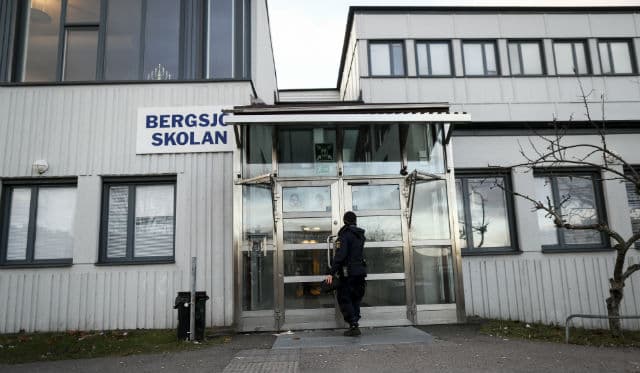Half pupils flunk school in crime-hit Swedish districts

More than half the pupils in many of Sweden’s ‘specially vulnerable’ regions leave elementary school with no qualification, a study carried out by Sweden’s TT newswire has found.
"We’re starting to approach rock-bottom when it comes to school inequalities,” Anders Trumberg, a schools researcher at Örebro University, told the newswire.
“Very often, pupils have social problems which spill over into school, making it hard for teachers to focus on teaching and pedagogy.”
Sweden’s police have classed 23 districts in the country as ‘specially vulnerable’, meaning a heavy criminal presence makes police work difficult and residents cannot rely on the criminal justice system.
In a majority of schools in the Gothenburg’s five ‘specially vulnerable’ districts, TT found, less than half of pupils leave elementary school with a qualification. The situation is similar in Seved and Rosengård in Malmö, and in Stockholm suburbs like Husby and Rinkeby.
In Bergsjöskolan in the Gothenberg suburb of Bergsjön, 69.8 percent of 15-year-olds finished the ninth, final class of elementary school without a qualification. And in Sjumilaskolan in the suburb of Biskopsgården 67.3 percent did so.
On average across Sweden, 17.5 percent of pupils fail to leave elementary school with a qualification.
Trumberg said Sweden’s school choice system contributed to the problem by allowing students from less troubled backgrounds to avoid the worst performing schools.
“It’s hard for today’s school system to handle the inequalities. In practice this beings enormous consequences for individual schools which are quite simply drained of pupils motivated to study.”
In many schools the situation has worsened over the past five years.
Manne Gerell, a criminologist from Malmö University, said that those who fail to leave school with a qualification were much more likely to be drawn into organised crime, making it hard to break the negative spiral in these districts.
“It’s about a pretty big volume of new youth coming in every year,” he said. “This of course makes it difficult to build a positive development in these areas.”
Trumberg said there was no “quick fix” for the problem.
“School is the arena where these inequalities become visible. But breaking the the underlying structural problems, such as child poverty, is not the responsibility of schools, but of labour market policy,” he said.
“Society needs to work broadly and over the long-term in a huge number of different policy areas to turn the situation around.”
Comments
See Also
"We’re starting to approach rock-bottom when it comes to school inequalities,” Anders Trumberg, a schools researcher at Örebro University, told the newswire.
“Very often, pupils have social problems which spill over into school, making it hard for teachers to focus on teaching and pedagogy.”
Sweden’s police have classed 23 districts in the country as ‘specially vulnerable’, meaning a heavy criminal presence makes police work difficult and residents cannot rely on the criminal justice system.
In a majority of schools in the Gothenburg’s five ‘specially vulnerable’ districts, TT found, less than half of pupils leave elementary school with a qualification. The situation is similar in Seved and Rosengård in Malmö, and in Stockholm suburbs like Husby and Rinkeby.
In Bergsjöskolan in the Gothenberg suburb of Bergsjön, 69.8 percent of 15-year-olds finished the ninth, final class of elementary school without a qualification. And in Sjumilaskolan in the suburb of Biskopsgården 67.3 percent did so.
On average across Sweden, 17.5 percent of pupils fail to leave elementary school with a qualification.
Trumberg said Sweden’s school choice system contributed to the problem by allowing students from less troubled backgrounds to avoid the worst performing schools.
“It’s hard for today’s school system to handle the inequalities. In practice this beings enormous consequences for individual schools which are quite simply drained of pupils motivated to study.”
In many schools the situation has worsened over the past five years.
Manne Gerell, a criminologist from Malmö University, said that those who fail to leave school with a qualification were much more likely to be drawn into organised crime, making it hard to break the negative spiral in these districts.
“It’s about a pretty big volume of new youth coming in every year,” he said. “This of course makes it difficult to build a positive development in these areas.”
Trumberg said there was no “quick fix” for the problem.
“School is the arena where these inequalities become visible. But breaking the the underlying structural problems, such as child poverty, is not the responsibility of schools, but of labour market policy,” he said.
“Society needs to work broadly and over the long-term in a huge number of different policy areas to turn the situation around.”
Join the conversation in our comments section below. Share your own views and experience and if you have a question or suggestion for our journalists then email us at [email protected].
Please keep comments civil, constructive and on topic – and make sure to read our terms of use before getting involved.
Please log in here to leave a comment.